What to Expect from the Markets this Week – 171125
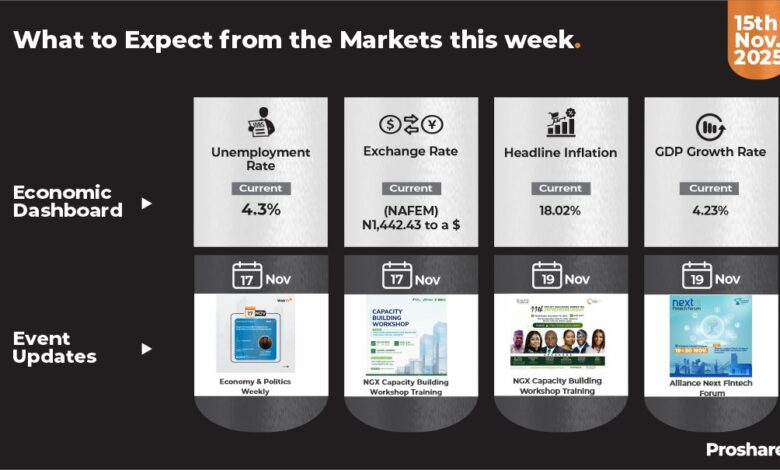
This week, the macroeconomic space was dominated by the sustained uptick in private sector activities across major sectors, the postponement of the 15% import duty on refined fuel to Q1 2026, the promised revision of the capital gain tax (CGT) that has rattled the markets, and NASS approval of the N1.15trn loan request. In the markets, while the naira depreciated slightly in the official window, fixed-income securities traded bullish, suppressing yields across the short to mid-tenors. The equities market extended its losing streak for the third week despite gains recorded in the last three trading sessions. We expect the October inflation rate, OMO maturities, and NTB auction to keep yields for fixed-income securities in check, while equities may sustain recent optimism following the announced revision of the CGT.
The Nigerian Economic Dashboard @141125
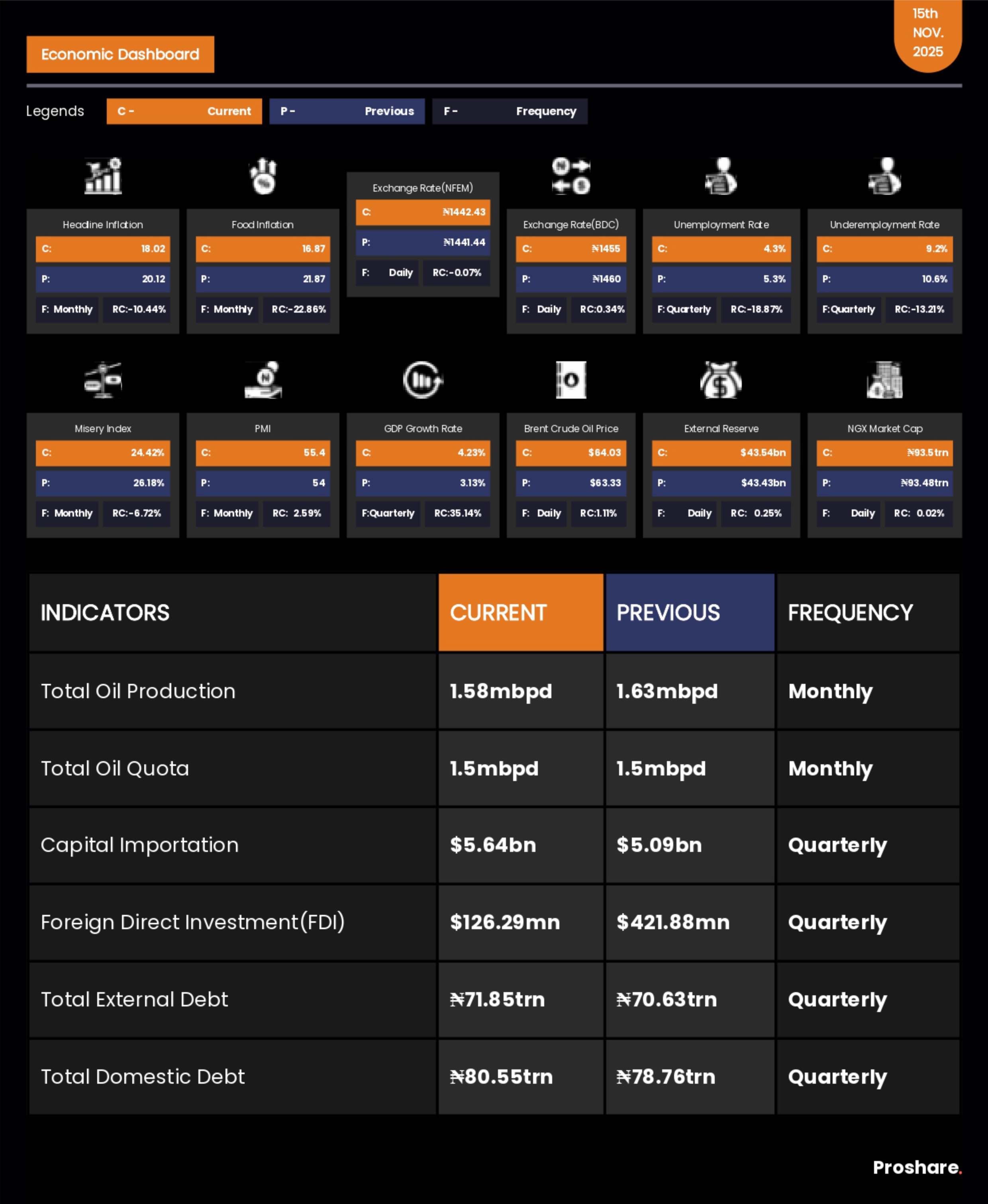
Economy
Nigeria’s Composite PMI Remains Hot in October
The Central Bank of Nigeria (CBN) revealed that Nigeria’s Composite Purchasing Managers Index (PMI) rose to 55.4 in October 2025 from 54.0 in September and 49.6 a year ago. The PMI for the Agricultural, Industrial, and Service sectors showed strong momentum, remaining above 50 points at 55.7, 54.2, and 55.6, respectively, in October 2025, up from 54.8, 51.4, and 54.7 in the previous month. The sustained strength in private sector activities is attributed to stable FX market conditions, moderating inflation, and an improvement in overall demand, which contributed to higher order and private sector output levels. We expect the expansion in private-sector activities to persist, driving GDP growth acceleration in Q4 2025, given sustained economic stability.
15% Petrol Import Duty Moved to 2026, Approved CGT to be Reviewed
The Nigerian government has announced its decision to postpone the planned implementation of a 15% ad valorem import duty on petrol and diesel imports until Q1 2026. The new tariff, calculated on the cost, insurance, and freight (CIF) value of imports, was described by the government as a ‘market-responsive import tariff framework’ designed to protect local refineries, promote crude transactions in naira, and boost competitiveness in domestic refining. However, this was met with mixed reactions by analysts, with reports indicating that imported petrol still meets about 67% of national demand. Similarly, Nigeria’s Minister of Finance, Wale Edun, affirmed that the implementation of the approved increase in Capital Gains Tax rate (CGT) from 10% to 30% for large companies will be subject to further review and consultation. Stakeholders in the capital market have expressed concerns that the CGT, set to take effect in January 2026, may discourage large-scale investment and dampen activities on the Nigerian bourse.
National Assembly Approves Tinubu’s N1.15trn Loan Request,
The National Assembly approved President Bola Tinubu’s request to borrow N1.15trn ($784m) from the domestic market to cover the 2025 budget gap between the N12.95trn deficit proposed by the executive and the N14.10trn passed by lawmakers. The approval follows a recent request, approval and issuance of $2.3bn Eurobond, which was oversubscribed by over $10.65bn upon Nigeria’s return to the international capital market. Nigeria’s 2025 budget stands at N59.99trn, with the deficit to be financed through a mix of external and domestic borrowing. According to the 2025 budget framework, total new external borrowing is projected at N1.8trn ($1.2bn), while the overall fiscal deficit stands at N9.28trn.
Table 1:
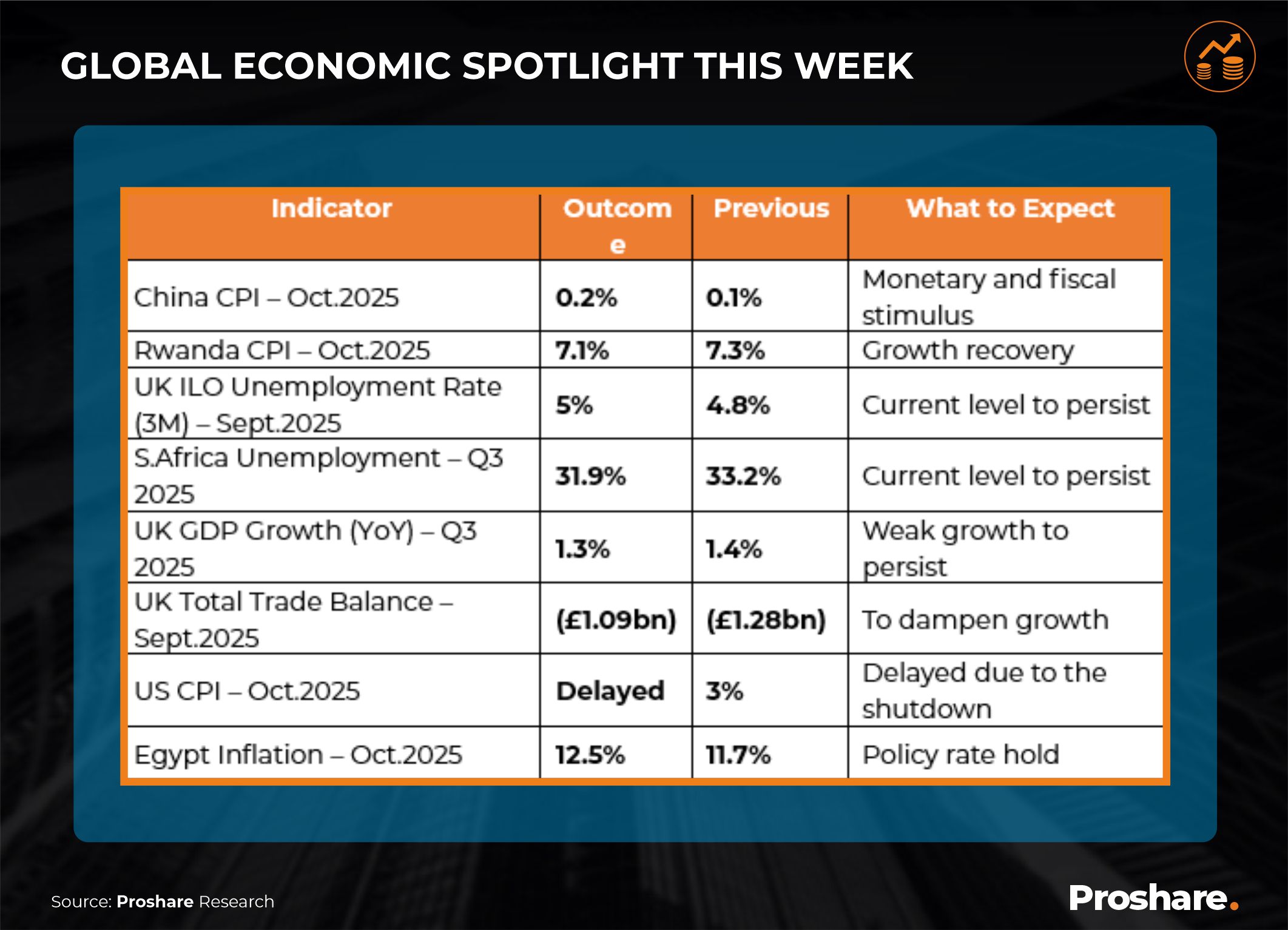
Table 2:
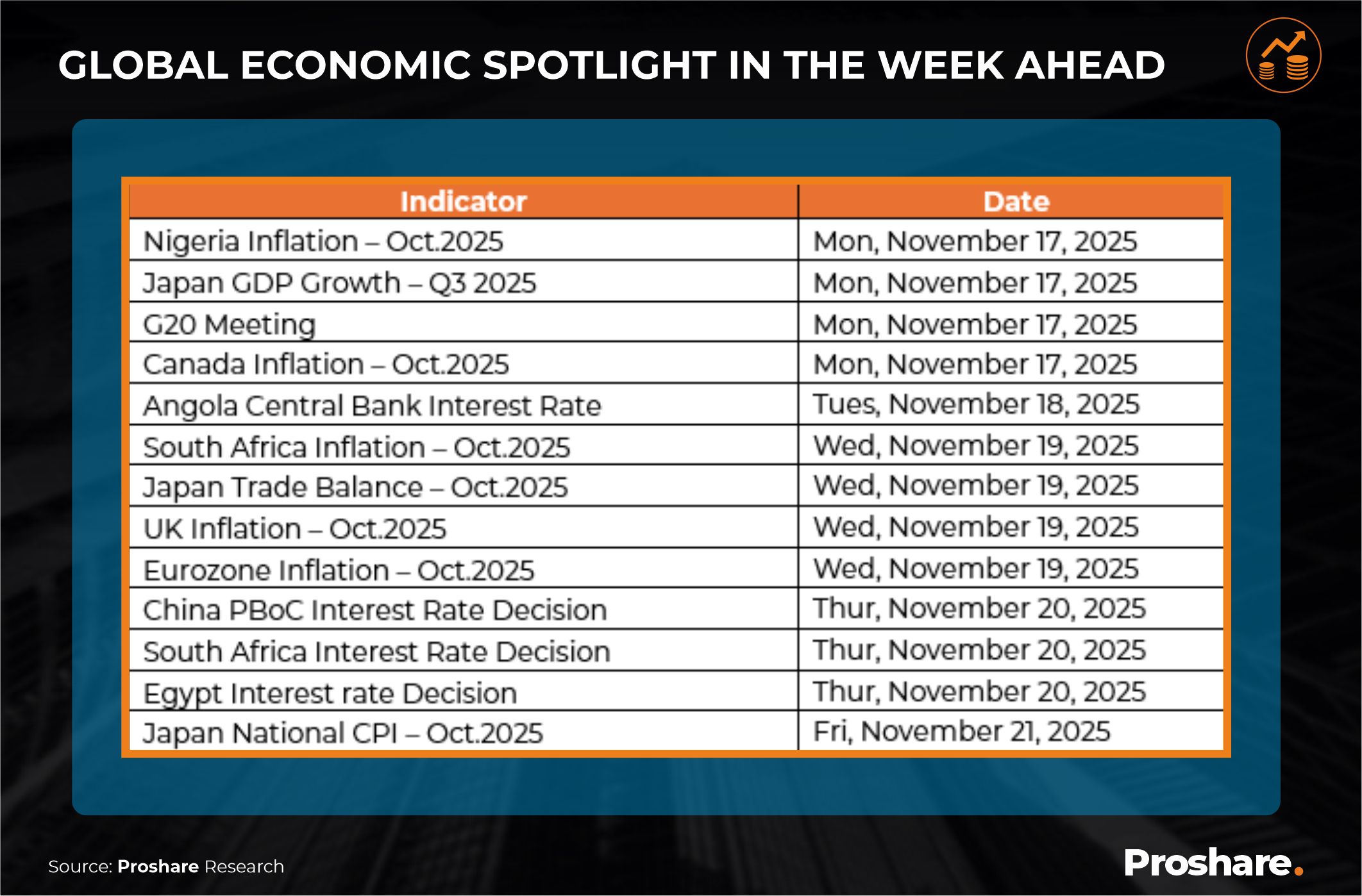
Commodity Market
Global Commodities
Global commodities closed the week mixed. Gold and silver declined as the possibility of a Fed rate cut in December weakened, along with safe-haven demand. Brent and WTI crude oil prices rose amid global supply uncertainties and the suspension of oil exports at a Russian port after a Ukrainian attack (See Table 3 below).
Table 3:
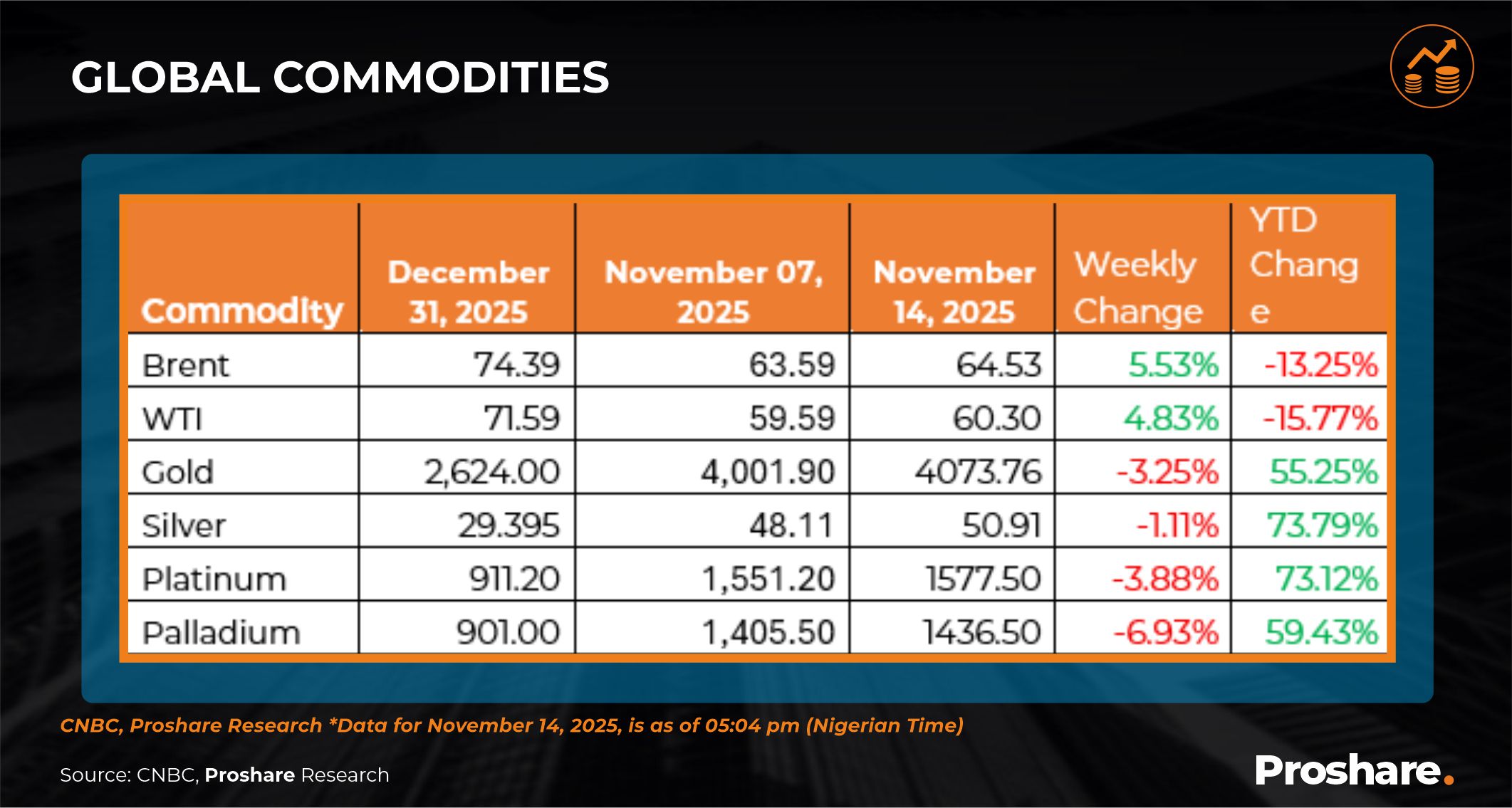
*Data for November 14, 2025, is as of 05:04 pm (Nigerian Time)
Local Commodities
The AFEX commodities ended the week largely in the red. However, Maize rose by 4.30%, due to high production costs, logistic costs, and sustained high demand from both food and feed sectors relative to available supply (see Table 4 below).
Table 4:
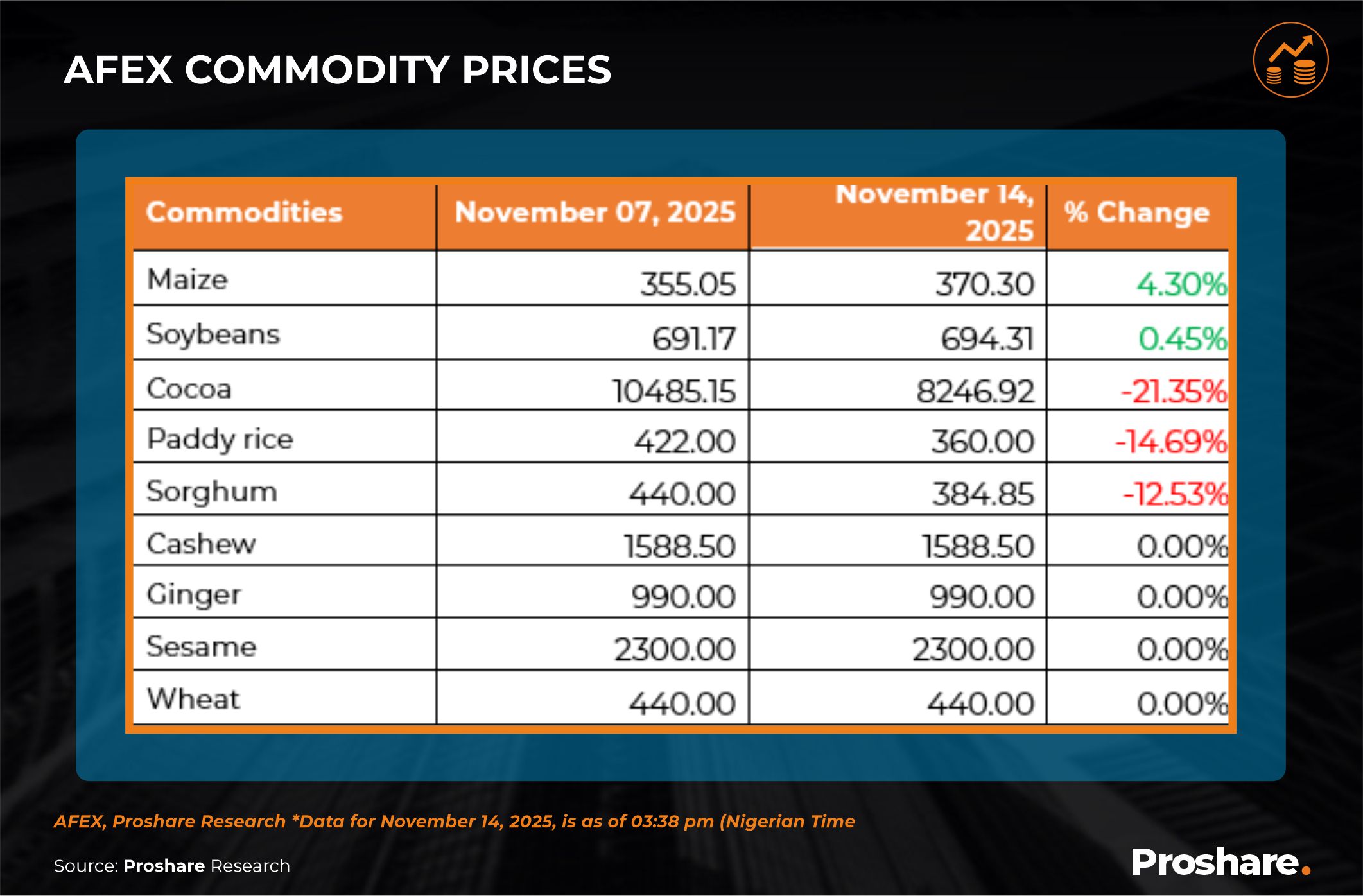
AFEX, Proshare Research *Data for November 14, 2025, is as of 03:38 pm (Nigerian Time
Lagos Commodities Market
Commodities at the Lagos Commodities and Futures Exchange (LCFE) closed flat (see Table 5 below).
Table 5:
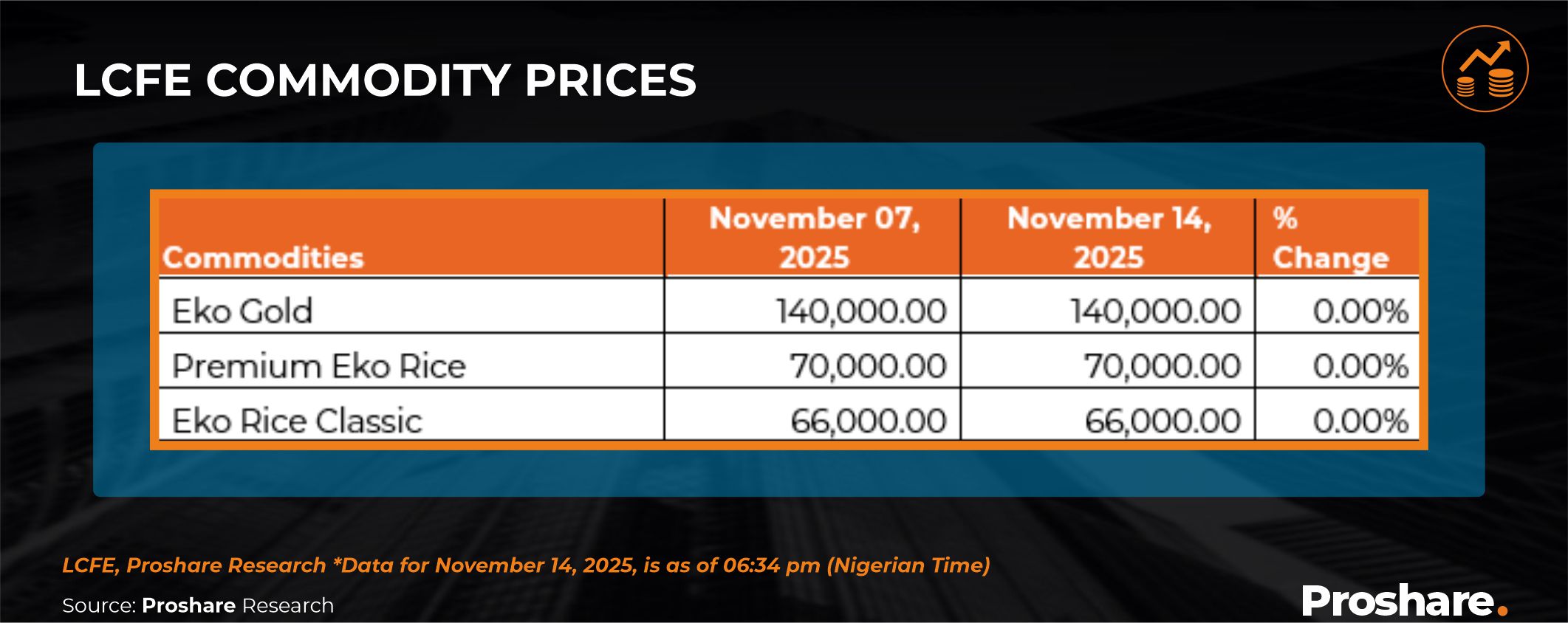
LCFE, Proshare Research *Data for November 14, 2025, is as of 06:34 pm (Nigerian Time)
Fixed Income Market
Currency Market
On Friday, the naira closed mixed, showing a N12.57 spread in opposite directions between the official and parallel markets. In the official market, the naira depreciated by 7bps on a day-to-day basis (from N1,441.44/US$) and by 41bps (week-on-week from N1,436.58/US$), closing at N1,442.43/US$.
In the parallel market, the naira appreciated by 34bps day-to-day, rising from N1,460/US$ on Thursday to close flat at N1,455/US$ week-on-week. (see table 6 below).
Table 6:
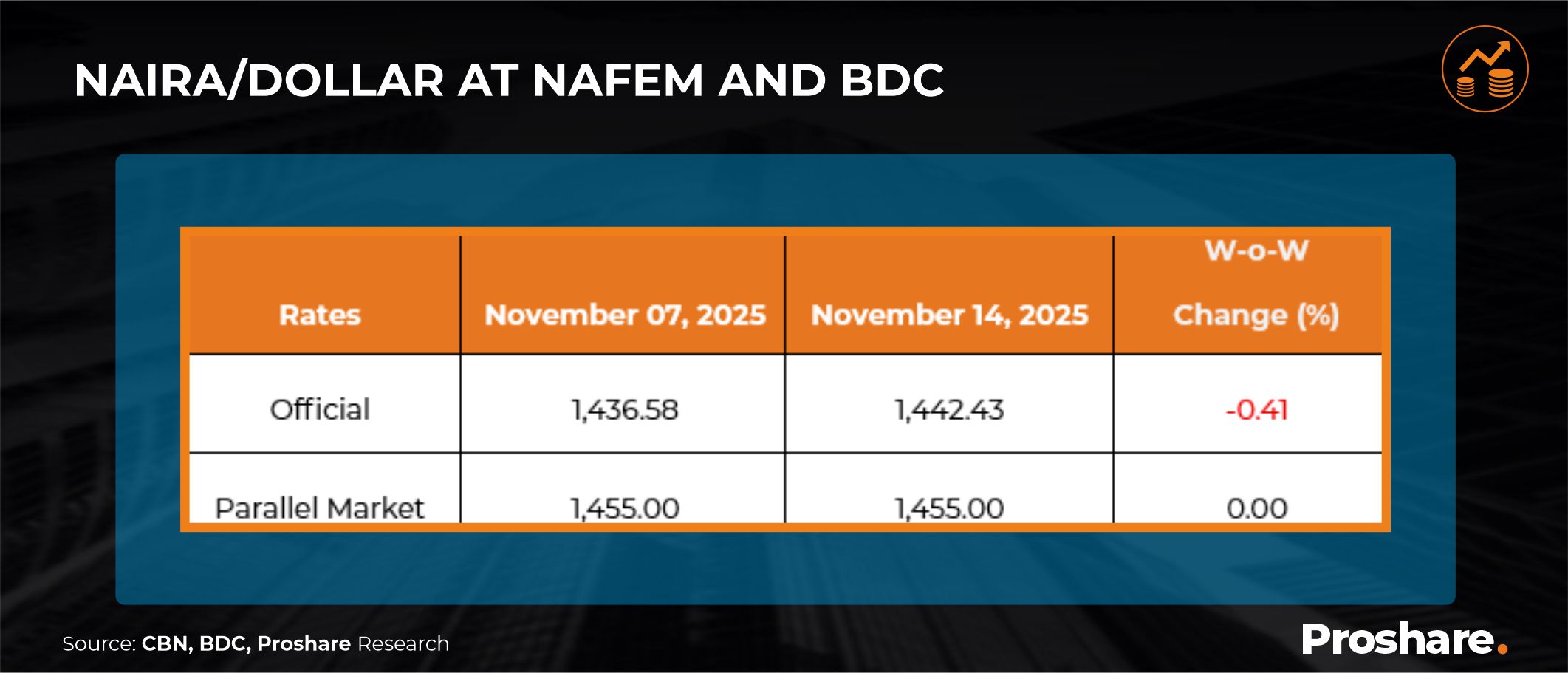
Source: CBN, BDC, Proshare Research
Money Market
This week, system liquidity remained positive, driven by the elevated Standing Deposit Facility (SDF), which rose to N4.84trn. A further mopping of excess liquidity from the system occurred today through the OMO auction, resulting in a mixed interbank rate close. The Open Repo Rate (OPR) remained steady at 24.50% while the overnight rate (O/N) increased by 13bps to settle at 24.92% from 24.79% the previous week (see table 7 below).
Table 7:
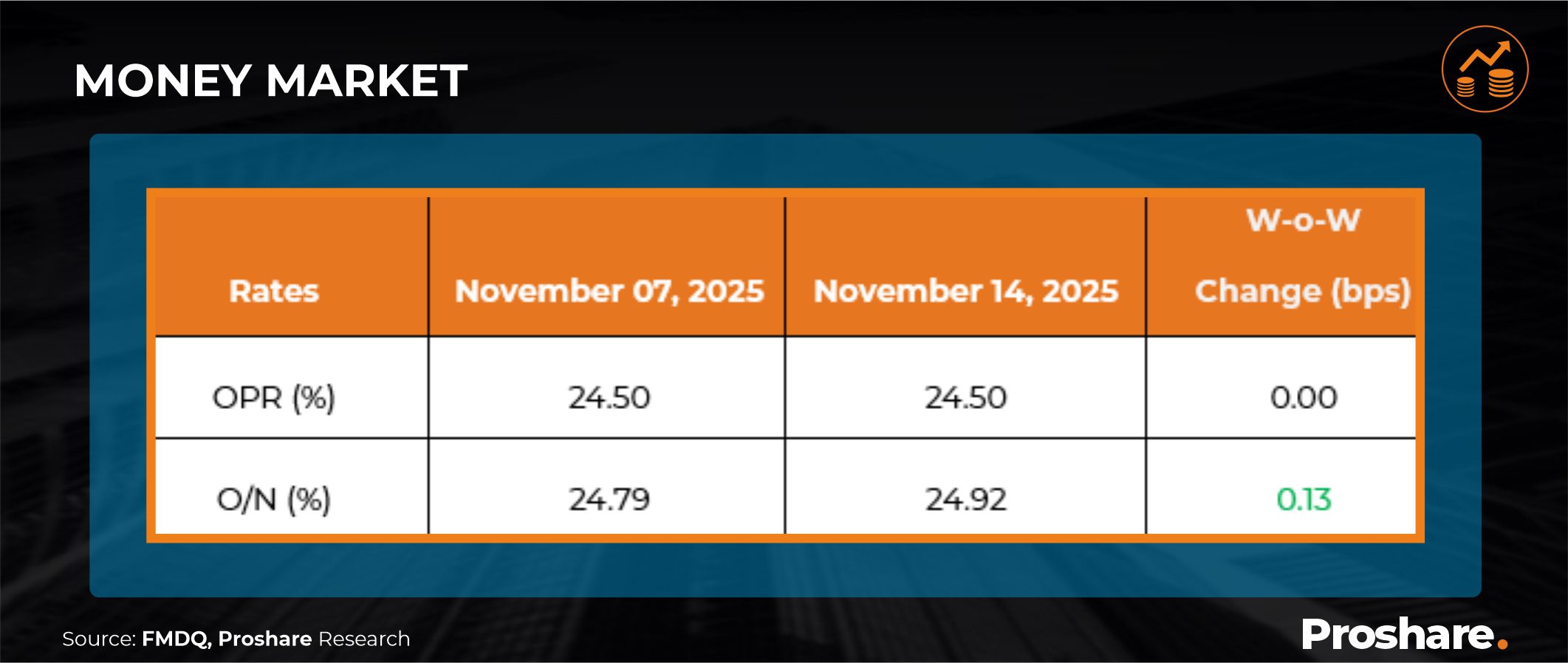
Source: FMDQ, Proshare Research
We expect rates to lower as next week’s FAAC allocation improves system liquidity.
Nigerian Treasury Bill
On Thursday, the CBN conducted an OMO auction across two maturities (152 and 173 days). The auction, which had a total offering of N600.00bn, was over-subscribed, with total subscriptions reaching N3.09trn (across the two tenors), while the CBN allotted N2.55trn. The 152-day bill was cleared at 20.59%, with N640.15bn allotted (the exact amount subscribed), while the 173-day bill was received at 20.69%, with N1.91trn allotted (Subscription: N2.45trn).
The secondary market traded bullish this week as the average benchmark yield declined across all segments. The NTB segment’s average benchmark yield declined by 28bps to close at 17.00% from 17.28% week-on-week. Similarly, the average benchmark yield of the OMO segment decreased by 38bps from 21.41% the prior week to settle at 21.03% (see Table 8 below).
Table 8:
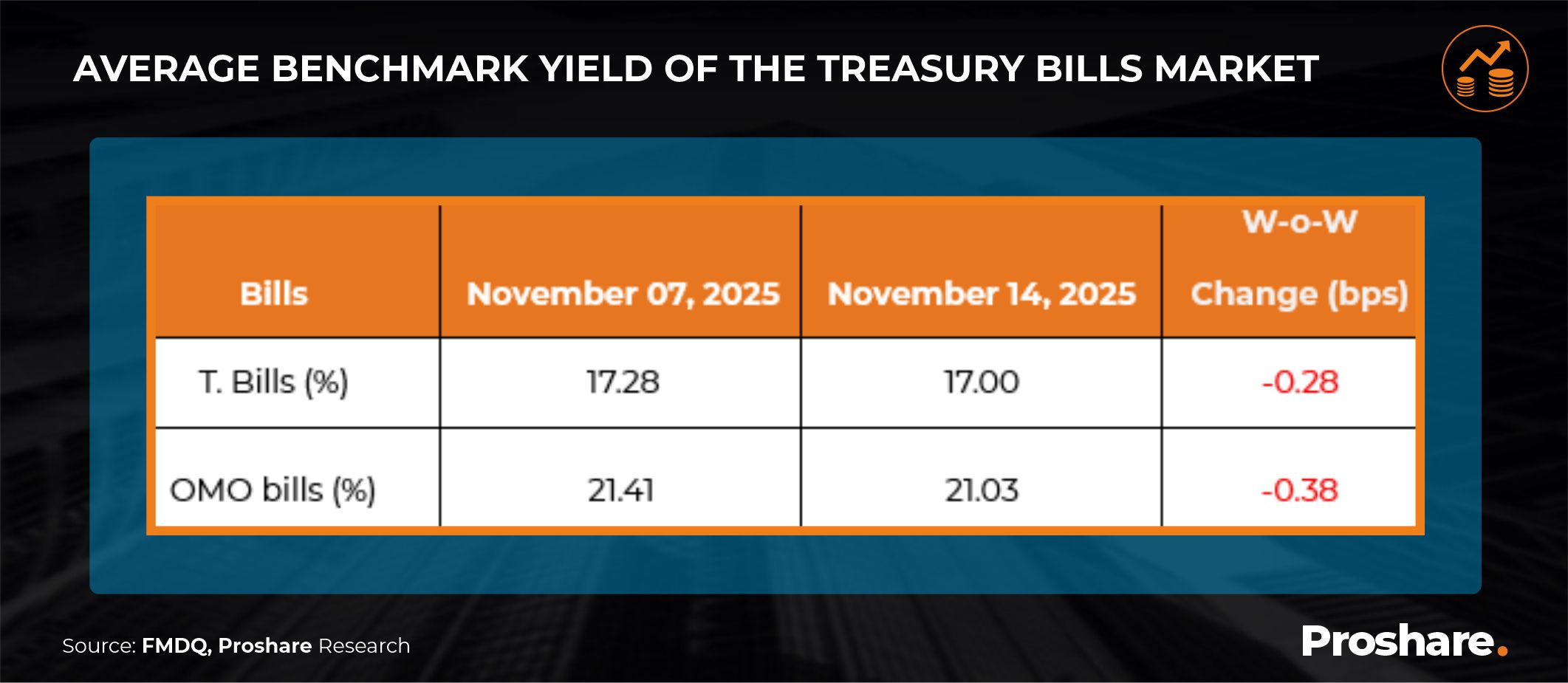
Source: FMDQ, Proshare Research
We expect rates to fall as unmet subscriptions in next week’s PMA saturate the secondary market
FGN Bond Market
In the November FGN Savings Bond auction, the DMO allocated a total of N3.83bn across two maturities (2-year and 3-year). The 2-year bond, with a coupon rate of 13.57%, received an allocation of N958.42m, with 1,866 successful subscriptions. Meanwhile, the 3-year bond had 2,003 successful subscriptions, with N2.87bn sold and a coupon rate of 14.57%.
The FGN Bond market traded mixed, albeit with a bullish undertone as increased buying interest flooded the short- and mid-end of the curve. The average benchmark yield declined by 16bps from 15.66% to settle at 15.50% week-on-week. Yields across the short- and mid-end of the curve fell by 6bps and 28bps to close at 15.64% and 15.42%, respectively, while the yield of the long-term maturity increased by 1bp to 15.58% from 15.57% the previous week (see table 9 below).
Table 9:
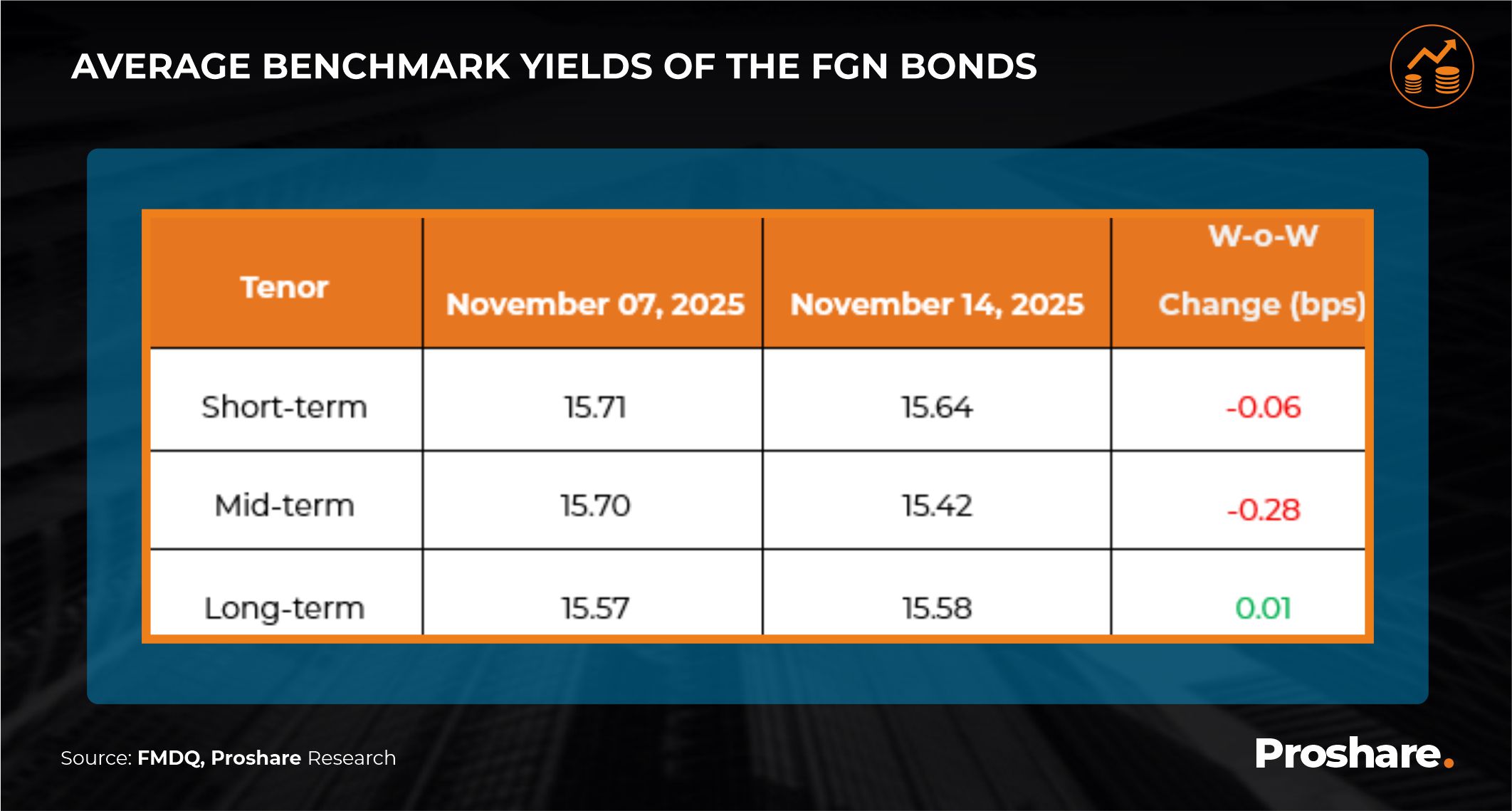
Source: FMDQ, Proshare Research
We expect yields to hover at the current level.
Equities Market
The domestic equities market traded bearish this week, marking three consecutive weeks of losses, despite recording gains for three out of the five trading sessions this week. The market is yet to recover fully, most especially from Tuesday’s dip to a record low (since 2010). As such, the NGX All-Share Index (ASI) depreciated by 1.68%, closing at 147,013.59 points, down from 149,524.81 points the previous week. Market capitalisation fell to N93.50trn, compared to N95trn the week before, a 1.58% WTD increase.
This week, the NGX activated the code for trading in the Presco Plc’s Rights Issue of 167m ordinary shares of 50 Kobo each at N1,420 per share in the ratio of one (1) new ordinary share for every existing six (6) ordinary shares held as at the close of business on Monday, 13 October 2025 (see chart 1 below).
Chart 1:
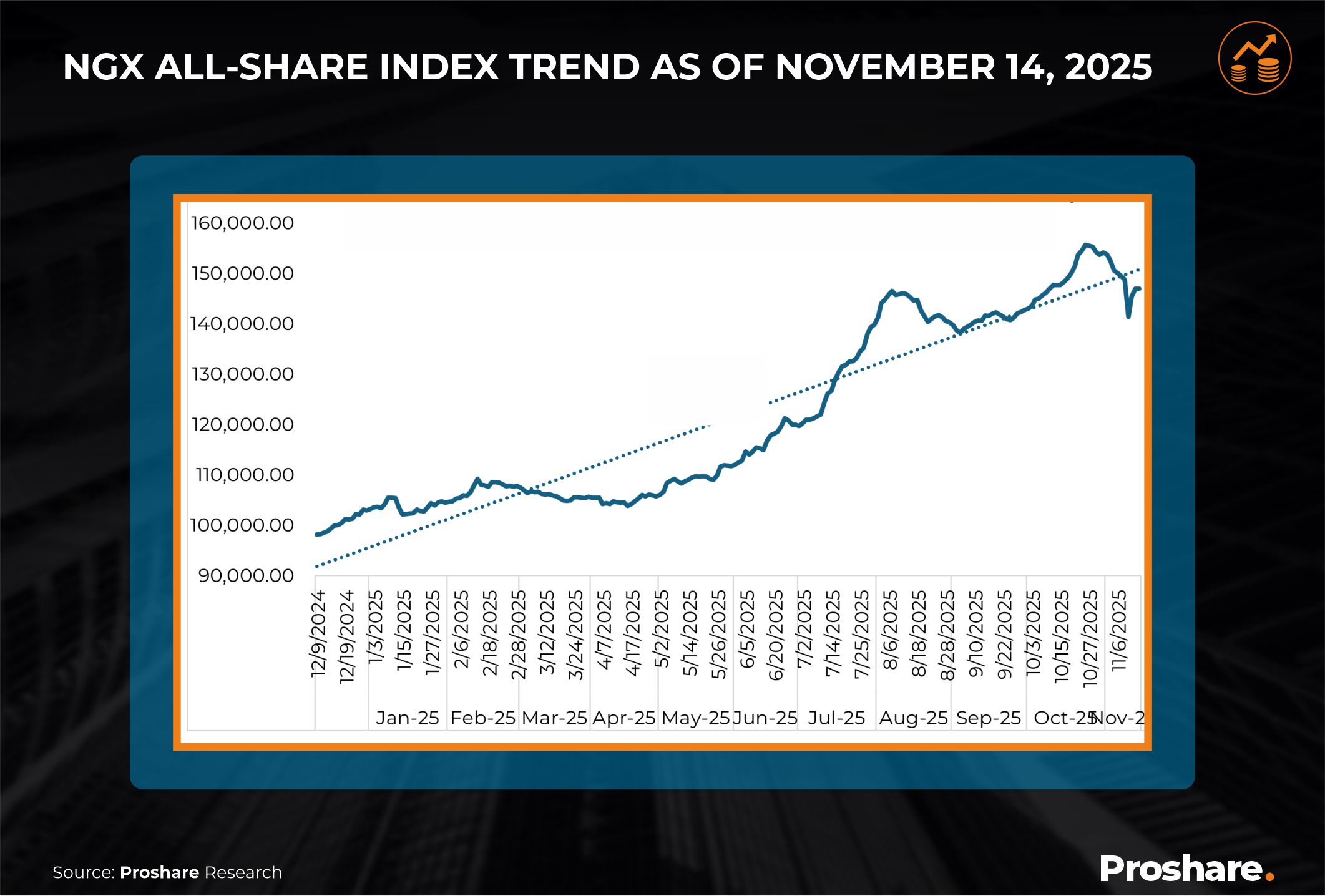
Forty-eight (48) equities appreciated during the week, led by heavyweight like NCR (+32.30%), NEM (+8.36%), OANDO (+7.87%), BERGER (+6.70%), ZENITHBANK (+6.67%), NASCON (+4.65), ACCESSCORP (+4.55%), NB (+4.48%), DANGSUGAR (+4.32%), NAHCO (+4.17%), EUNISELL (+2.68%), CUSTODIAN (+2.60%), TRANSCORP (+2.50%), PZ (+2.39%), WAPCO (+2.29%), and GTCO (+1.18%), on the flip side forty-five equities declined in price led by heavyweight like DANGCEM (-10.00%), TRANSPOWER (-10.00%), NGXGROUP (-6.98%), BUACEMENT (-6.67%), STANBIC (-6.54%), BETAGLAS (-6.02%), CADBURY (-5.76%), GUINNESS (-3.79%), ETI (-2.39%), FIRSTHOLDCO (-2.06%), PRESCO (-2.03%), UNILEVER (-2.00%), SEPLAT (-1.83%), ARADEL (-1.23%), JBERGER (-0.50%), and MTNN (-0.42%),
A total turnover of 7.33bn shares worth N156.43bn in 134,383 deals was traded this week on NGX, in contrast to a total of 3.58bn shares valued at N107.01bn that exchanged hands last week in 146,429 deals.
The Financial Services Industry (measured by volume) led the activity chart with 6.50bn shares valued at N87.38bn traded in 56,148 deals; contributing 88.69% and 55.86% to the total equity turnover volume and value, respectively. The Consumer Goods Industry followed with 180.78m shares worth N12.02bn in 16,378 deals. Then the Services Industry, with 138.37m shares worth N2.40bn in 7,869 deals.
Of the twenty indices under our coverage for the week, eleven indices gained, led by the NGX Insurance Index, while nine indices lost, led by the NGX Growth Index (see Table 10 below).
Table 10:
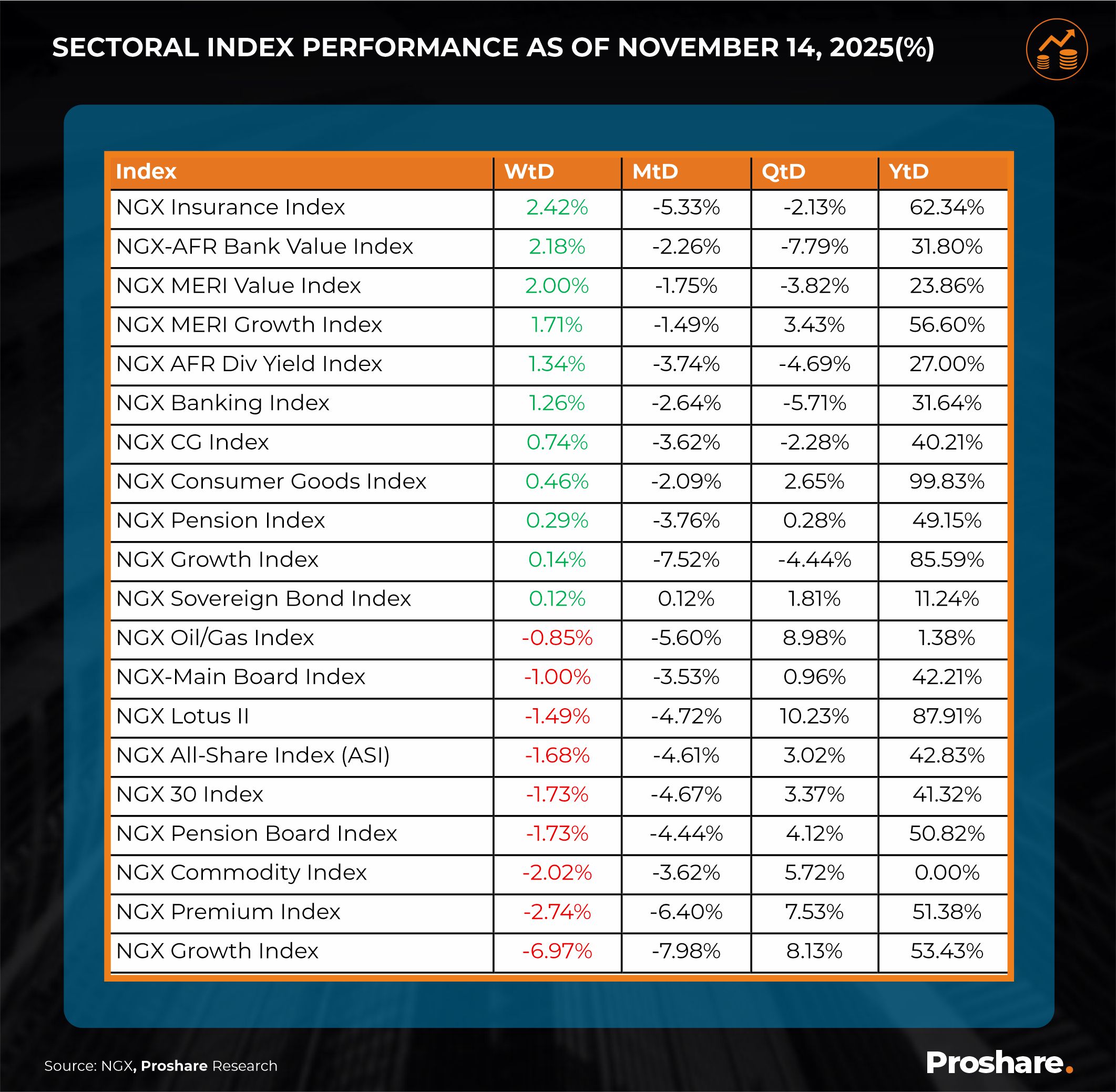
Source: NGX, Proshare Research
NASD OTC EXCHANGE – Unlisted Equities
The unlisted NASD OTC market also closed bearish this week, recouping last week’s gains, with the NSI decreasing 1.31% to close at 3,613.23 points, down from 3,661.07 points the previous week. The total volume and value traded for the week increased significantly by 1,567.46% and 2,330.10%, respectively. The NASD market Capitalisation settled at N2.16trn.
The market downtick this week was driven by losses in 11 (-8.93%), FCWAMCO (-14.93%), UBNPROP (-1.27%) and FOODCPT (-0.85%), which overpowers the gains in AFRILAND (+1.93%), CSCS (+1.00%), and NASD (+2.46%) (see Table 11 below).
Table 11:
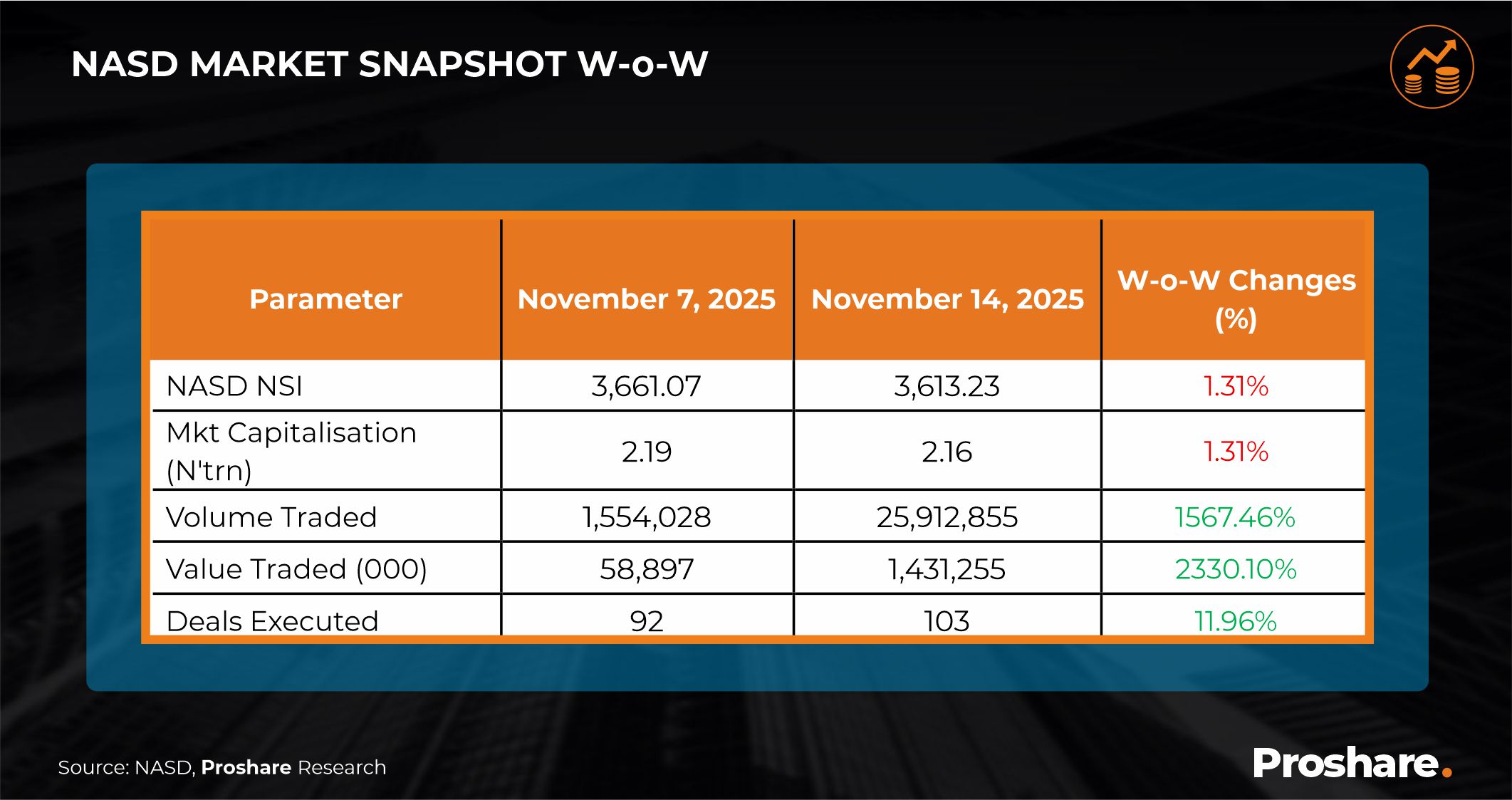
Source: NASD, Proshare Research
Proshare Indices
The Proshare Memorandum Index closed mixed, with the float-adjusted index outperforming the market benchmark for the week. The float-adjusted index was up 0.15% to 624.10 points, while the price-weighted index fell 3.15% to close at 905.43 points (see Table 12 below).
Table 12:
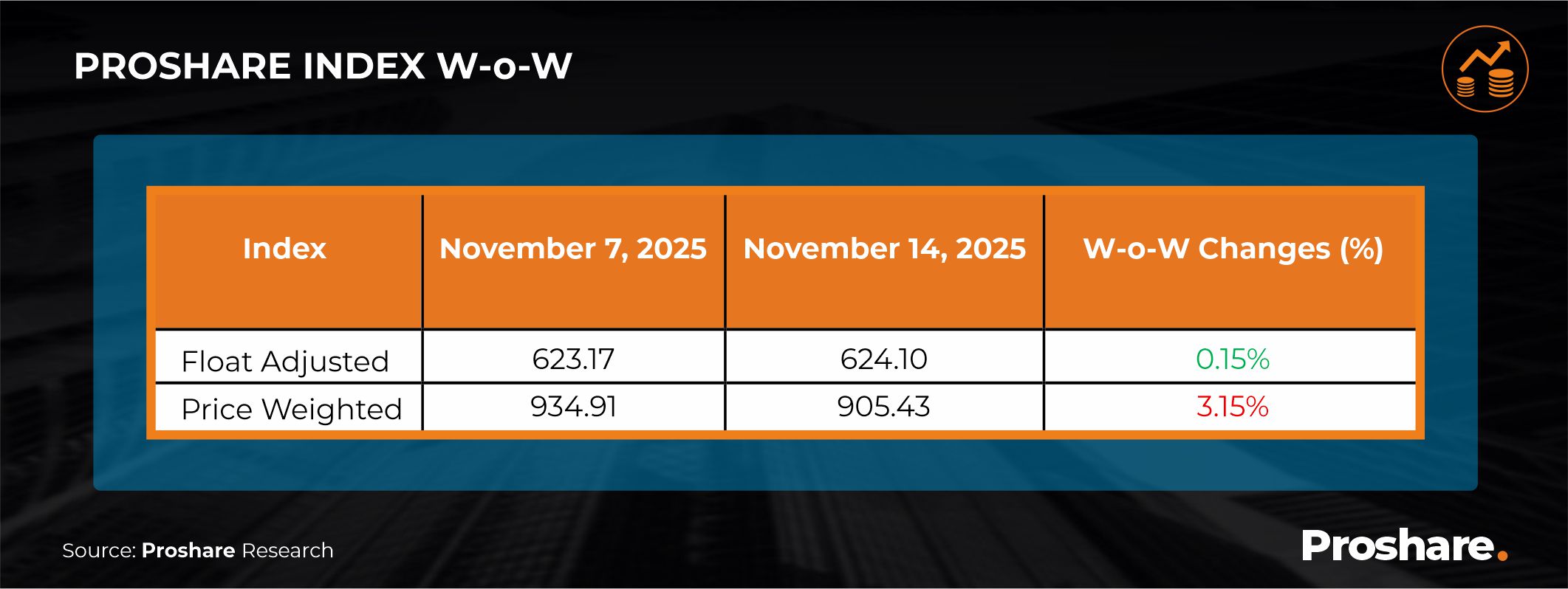
We expect sustained optimism, particularly from institutional investors, following the announced revision of the Capital Gains Tax.
Source: Proshare.co




